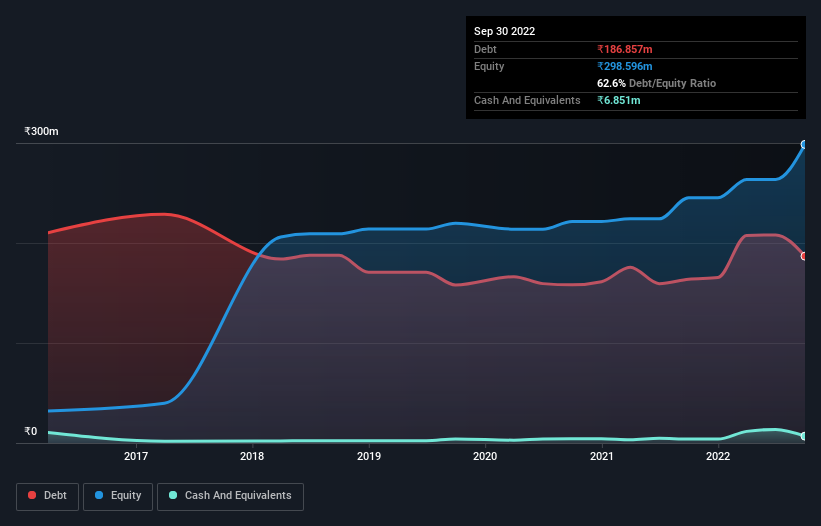Vaishali Pharma (NSE:VAISHALI) Seems To Use Debt Quite Sensibly

Howard Marks put it nicely when he said that, rather than worrying about share price volatility, 'The possibility of permanent loss is the risk I worry about... and every practical investor I know worries about.' It's only natural to consider a company's balance sheet when you examine how risky it is, since debt is often involved when a business collapses. We can see that Vaishali Pharma Limited (NSE:VAISHALI) does use debt in its business. But the more important question is: how much risk is that debt creating?
Why Does Debt Bring Risk?
Debt assists a business until the business has trouble paying it off, either with new capital or with free cash flow. Part and parcel of capitalism is the process of 'creative destruction' where failed businesses are mercilessly liquidated by their bankers. While that is not too common, we often do see indebted companies permanently diluting shareholders because lenders force them to raise capital at a distressed price. Of course, the upside of debt is that it often represents cheap capital, especially when it replaces dilution in a company with the ability to reinvest at high rates of return. When we think about a company's use of debt, we first look at cash and debt together.
Our analysis indicates that VAISHALI is potentially overvalued!
How Much Debt Does Vaishali Pharma Carry?
You can click the graphic below for the historical numbers, but it shows that as of September 2022 Vaishali Pharma had ₹186.9m of debt, an increase on ₹163.8m, over one year. However, it also had ₹6.85m in cash, and so its net debt is ₹180.0m.

How Strong Is Vaishali Pharma's Balance Sheet?
According to the last reported balance sheet, Vaishali Pharma had liabilities of ₹412.0m due within 12 months, and liabilities of ₹38.1m due beyond 12 months. Offsetting this, it had ₹6.85m in cash and ₹492.5m in receivables that were due within 12 months. So it actually has ₹49.3m more liquid assets than total liabilities.
This surplus suggests that Vaishali Pharma has a conservative balance sheet, and could probably eliminate its debt without much difficulty.
In order to size up a company's debt relative to its earnings, we calculate its net debt divided by its earnings before interest, tax, depreciation, and amortization (EBITDA) and its earnings before interest and tax (EBIT) divided by its interest expense (its interest cover). Thus we consider debt relative to earnings both with and without depreciation and amortization expenses.
Vaishali Pharma's net debt of 2.3 times EBITDA suggests graceful use of debt. And the fact that its trailing twelve months of EBIT was 7.8 times its interest expenses harmonizes with that theme. Importantly, Vaishali Pharma grew its EBIT by 75% over the last twelve months, and that growth will make it easier to handle its debt. When analysing debt levels, the balance sheet is the obvious place to start. But it is Vaishali Pharma's earnings that will influence how the balance sheet holds up in the future. So if you're keen to discover more about its earnings, it might be worth checking out this graph of its long term earnings trend.
But our final consideration is also important, because a company cannot pay debt with paper profits; it needs cold hard cash. So it's worth checking how much of that EBIT is backed by free cash flow. During the last three years, Vaishali Pharma produced sturdy free cash flow equating to 51% of its EBIT, about what we'd expect. This free cash flow puts the company in a good position to pay down debt, when appropriate.
Our View
The good news is that Vaishali Pharma's demonstrated ability to grow its EBIT delights us like a fluffy puppy does a toddler. And we also thought its interest cover was a positive. Looking at the bigger picture, we think Vaishali Pharma's use of debt seems quite reasonable and we're not concerned about it. After all, sensible leverage can boost returns on equity. There's no doubt that we learn most about debt from the balance sheet. But ultimately, every company can contain risks that exist outside of the balance sheet. Case in point: We've spotted 2 warning signs for Vaishali Pharma you should be aware of, and 1 of them shouldn't be ignored.
If you're interested in investing in businesses that can grow profits without the burden of debt, then check out this free list of growing businesses that have net cash on the balance sheet.
New: Manage All Your Stock Portfolios in One Place
We've created the ultimate portfolio companion for stock investors, and it's free.
• Connect an unlimited number of Portfolios and see your total in one currency
• Be alerted to new Warning Signs or Risks via email or mobile
• Track the Fair Value of your stocks
Have feedback on this article? Concerned about the content? Get in touch with us directly. Alternatively, email editorial-team (at) simplywallst.com.
This article by Simply Wall St is general in nature. We provide commentary based on historical data and analyst forecasts only using an unbiased methodology and our articles are not intended to be financial advice. It does not constitute a recommendation to buy or sell any stock, and does not take account of your objectives, or your financial situation. We aim to bring you long-term focused analysis driven by fundamental data. Note that our analysis may not factor in the latest price-sensitive company announcements or qualitative material. Simply Wall St has no position in any stocks mentioned.
About NSEI:VAISHALI
Vaishali Pharma
Engages in the pharmaceutical business in India and internationally.
Adequate balance sheet and slightly overvalued.
Similar Companies
Market Insights
Community Narratives



